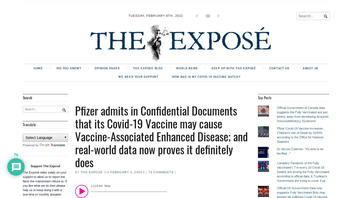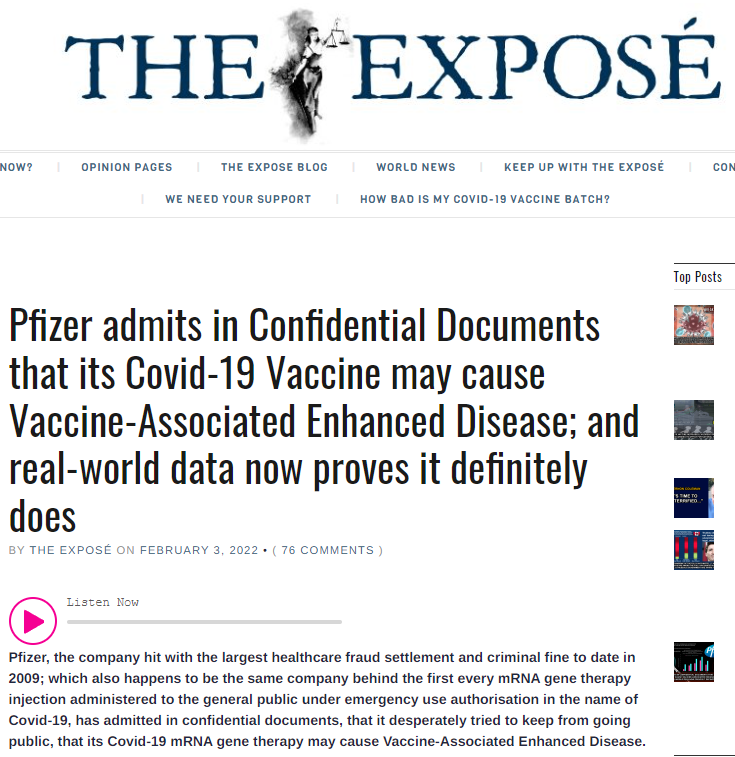STORY UPDATED: check for updates below.

Does Pfizer admit in confidential documents that its COVID-19 vaccine may cause vaccine-associated enhanced disease (VAED)? No, that's not true: The document, called 5.3.6 CUMULATIVE ANALYSIS OF POST-AUTHORIZATION ADVERSE EVENT REPORTS OF PF-07302048 (BNT162B2) RECEIVED THROUGH 28-FEB-2021, lists VAED under "Important Potential Risk," but also notes, "No post-authorized AE [adverse event] reports have been identified as cases of VAED ..., therefore, there is no observed data at this time."
The claim appeared in an article (archived here) published by The Exposé on February 3, 2022, under the title "Pfizer admits in Confidential Documents that its Covid-19 Vaccine may cause Vaccine-Associated Enhanced Disease; and real-world data now proves it definitely does." It opened:
Pfizer, the company hit with the largest healthcare fraud settlement and criminal fine to date in 2009; which also happens to be the same company behind the first every mRNA gene therapy injection administered to the general public under emergency use authorisation in the name of Covid-19, has admitted in confidential documents, that it desperately tried to keep from going public, that its Covid-19 mRNA gene therapy may cause Vaccine-Associated Enhanced Disease.
This is what the article looked like on The Exposé website on February 8, 2022:
(Source: The Exposé screenshot taken on Tue Feb 8 19:31:00 2022 UTC)
Part of the process
The Pfizer document was released as part of a Freedom of Information Act request by a group of more than 30 professors and scientists from universities including Harvard, Yale, Brown and UCLA. In their lawsuit filed September 16, 2021, the plaintiffs asked the Food and Drug Administration to share the data it relied upon in licensing Pfizer's COVID vaccine. This paperwork was part of a larger document submitted by Pfizer, referred to as a biologics license application, or BLA, the FDA said in a February 8, 2022, email to Lead Stories. It's required as part of the process:
The Biologics License Application (BLA) is a request for permission to introduce, or deliver for introduction, a biologic product into interstate commerce (21 CFR 601.2). The BLA is regulated under 21 CFR 600 - 680. A BLA is submitted by any legal person or entity who is engaged in manufacture or an applicant for a license who takes responsibility for compliance with product and establishment standards. Form 356h specifies the requirements for a BLA. This includes:
- Applicant information
- Product/Manufacturing information
- Pre-clinical studies
- Clinical studies
- Labeling
All applicants must fill out the same forms, which include potential risks. It's not an admission of a problem, but a requirement of the process. Under "Important Potential Risk" (Table 5) in the Pfizer document, it includes VAED, including vaccine-associated enhanced respiratory disease (VAERD). The report covers information through February 28, 2021. It says:
No post-authorized AE reports have been identified as cases of VAED/VAERD, therefore, there is no observed data at this time. An expected rate of VAED is difficult to establish so a meaningful observed/expected analysis cannot be conducted at this point based on available data.
In a February 8, 2022, email to Lead Stories, Keanna Ghazvini with Pfizer global media relations provided this statement from the company, covering developments since the original document was put together (words in bold appeared in bold in the statement):
We take adverse events that are potentially associated with the Pfizer-BioNTech COVID-19 vaccine very seriously. As part of our post-marketing responsibilities, we closely monitor all adverse events and collect relevant information to share with global regulatory authorities. It is important to note there is no evidence to suggest our vaccine causes vaccine associated enhanced disease.
What is VAED?
The Melbourne [Australia] Vaccine Education Centre provides this definition of VAED:
Vaccine-associated enhanced disease (VAED) occurs when an individual who has received a vaccine, develops a more severe presentation of that disease when subsequently exposed to that virus, compared with when infection occurs without prior vaccination. This assumes that the vaccine recipient has not previously been exposed to the disease and is seronegative at time of immunisation.
The potential for vaccination with a SARS-CoV-2 vaccine to be associated with enhanced disease after subsequent infection is a theoretical risk, and the vaccine-induced antibody (so called antibody dependent enhancement) or TH1 biased T-cell responses leading to adverse responses to natural SARS-CoV-2 infection need to be carefully evaluated once a COVID-19 vaccine rollout commences.
VAED is also known as antibody-dependent enhancement (ADE) or vaccine enhanced disease (VED). Nebraska Medicine infectious diseases expert and physician Nada Fadul says there's no evidence to support the claim that the Pfizer vaccine is showing up in the real world:
Antibody-dependent enhancement (ADE) is something researchers watch for very carefully and is extremely rare. In ADE, certain antibodies make it easier for viruses to get into cells. This is bad because it would mean a virus or a vaccine makes people more at risk for severe disease.
If COVID-19 vaccines caused ADE, people who are vaccinated against COVID-19 would have more severe disease. This is not happening. On the contrary, people who are vaccinated typically have very mild disease or none at all. In fact, the majority of COVID-19 deaths in the U.S. are people who aren't fully vaccinated.
Not in the stats
In a February 9, 2022, email to Lead Stories, the Office of National Statistics in the United Kingdom agreed. It said there's no evidence to suggest COVID vaccines are causing VAED. It's not showing up in their numbers:
In the period July to December 2021, the age-adjusted risk of death involving coronavirus (COVID-19) was 93.4% lower for people who had received a third dose, or booster, at least 21 days ago compared with unvaccinated people.
In the period July to December 2021, the age-adjusted risk of death involving COVID-19 was 81.2% lower for people who had received a second dose at least 21 days ago compared with unvaccinated people; for January to June 2021, this was 99.5% lower.
Vaccine Adverse Event Reporting System
Vaccine manufacturers are required to report adverse events to regulatory authorities, including European health organizations and the Vaccine Adverse Event Reporting System (VAERS) in the United States, which is run by the Centers for Disease Control and Prevention and the FDA.
Anyone with internet access can add a report to the VAERS list of reports. The public access link to it expressly warns against unwarranted conclusions based on VAERS material because the list only provides a tally of unverified notes about any health event people experience after they are vaccinated.
The list itself cannot be used to prove or quantify, since all it shows is a chronological correlation, not the causal link that would be more difficult to establish. It's the equivalent of a police precinct's running "blotter" of reports that may serve as a starting point for police work, not an endpoint.
The FDA also said in its February 8, 2022, email to Lead Stories:
It's important to note that reports of adverse events to the Vaccine Adverse Event Reporting System (VAERS) following vaccination, including deaths, do not necessarily mean that a vaccine caused a health problem. In fact, reviews by FDA and CDC have determined that the vast majority of the deaths reported are not directly attributable to the vaccines. FDA requires healthcare providers to report any death after COVID-19 vaccination to VAERS, even if it's unclear whether the vaccine was the cause. Reports of adverse events to VAERS following vaccination, including deaths, do not necessarily mean that a vaccine caused a health problem.
Reports of death after COVID-19 vaccination are rare. As reported on CDC's website, more than 543 million doses of COVID-19 vaccines were administered in the United States from December 14, 2020, through February 3, 2022. During this time, VAERS received 12,122 preliminary reports of death (0.0022%) among people who received a COVID-19 vaccine. CDC and FDA clinicians review reports of death to VAERS including death certificates, autopsy, and medical records. A review of reports indicates a causal relationship between the J&J/Janssen COVID-19 vaccine and TTS [thrombosis with thrombocytopenia]. ...
Continued monitoring has identified nine deaths causally associated with J&J/Janssen COVID-19 vaccination. CDC and FDA continue to review reports of death following COVID-19 vaccination and update information as it becomes available.
Lead Stories previously debunked another claim stemming from the Pfizer document released as part of a Freedom of Information Act request. You can read that story here.
Updates:
-
2022-02-09T17:24:53Z 2022-02-09T17:24:53Z This story has been updated with information from the Office of National Statistics in the United Kingdom.



















